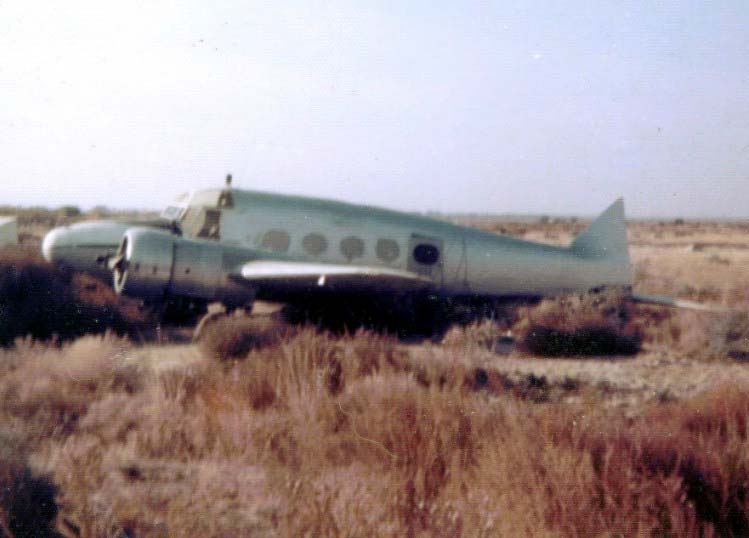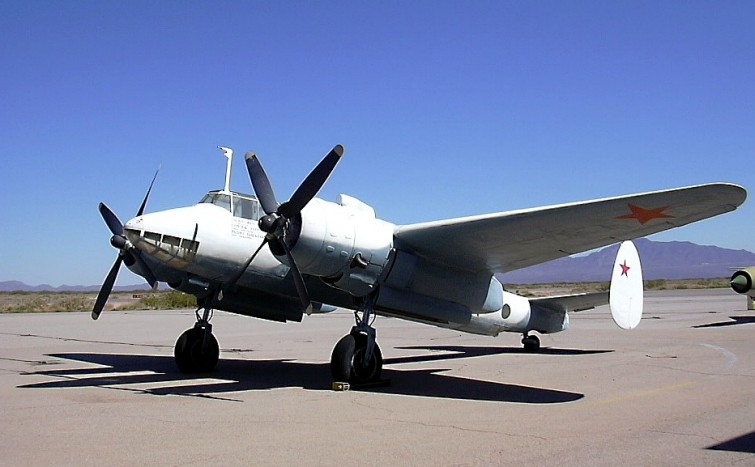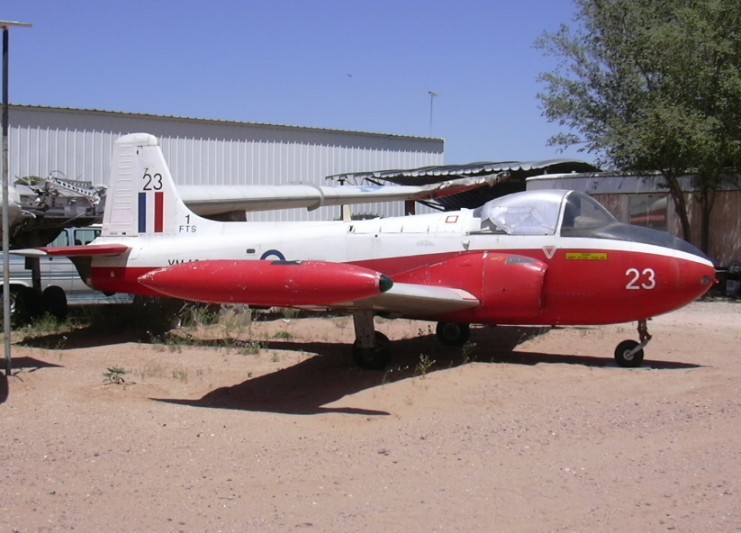 |
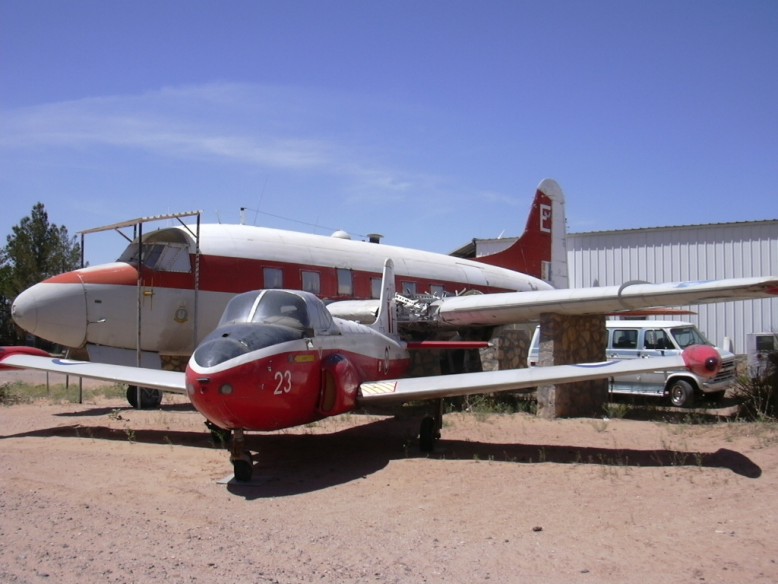 |
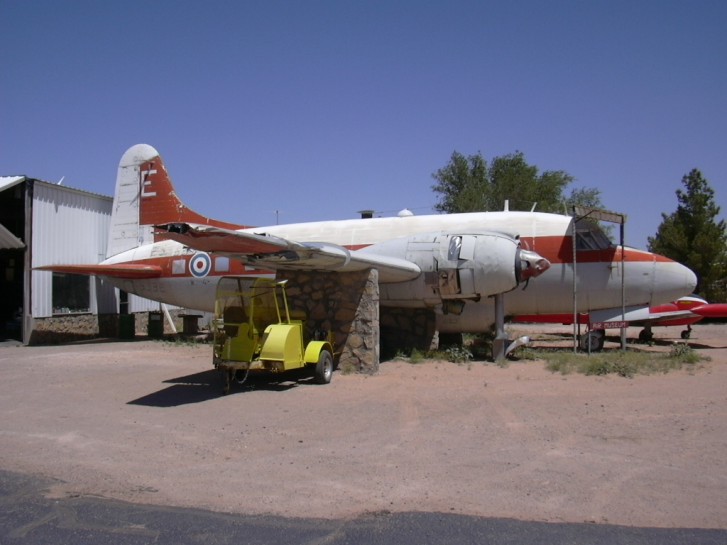 |
 |
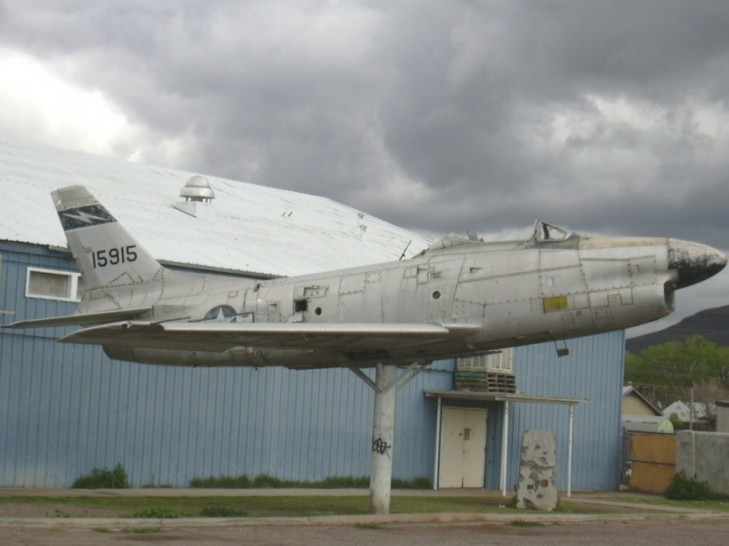 |
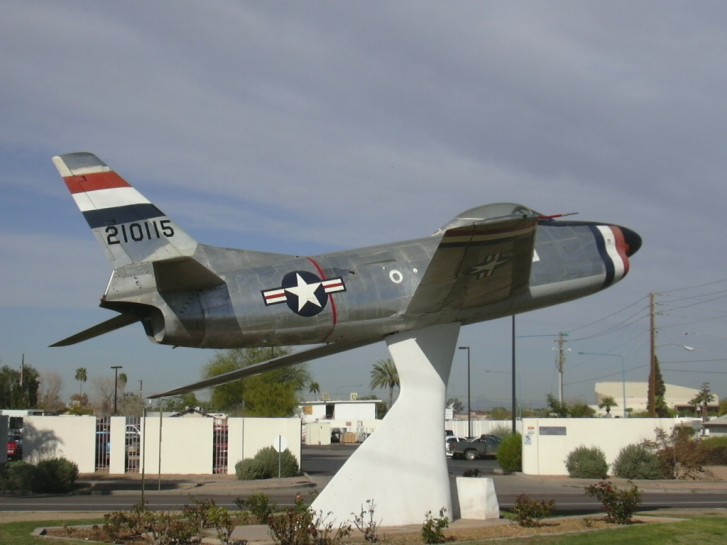 |
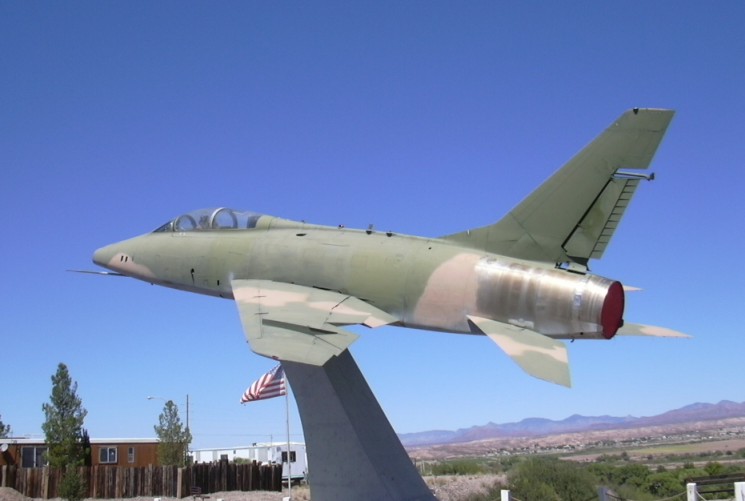 |
 |
F-86D 52-6261 is displayed in Chandler, AZ. The photo was taken earlier the same day as the above shot and illustrates how much the weather can change in the desert in the course of a few hours. (CB)
F-100F 56-3812 is on display in the Veteran's Park in Duncan, AZ. At one time she had been converted to a QF-100. September 12, 2003. (CB)
F-100D 54-2281 on display in a park in Glendale, AZ in March, 2005. (CB)
This Anson was a fixture for many years at the Fabens, Texas airport. The plane crashed during the early 1970s while on a delivery flight. I don't even know the mark of Anson, identification, or even the ultimate fate. I have been told this aircraft was acquired by an air museum in Texas, but have no clues as to who or where. This poor quality photo was taken by me in 1977. (CB)
During the 1960s Ratheon used a handful of F-89s for work with the U.S. Army developing ADA systems. When the program ended at least two of the F-89s stayed at El Paso International Airport. After being abandoned for many years they were towed into the desert between runways 4/22 and 8R/26L for fire fighting practice. In the summer of 1980 I photographed F-89D 52-1916. Oddly enough the airframe is currently at the new(er) ELP ARF facility. (CB)
A fixture for many years in a park in Artesia, New Mexico is F-84F 51-9486. This former ANG bird had been displayed at ground level before recently being placed atop a pole. Though it seems to have been overlooked by vandals, this location will provide better protection. Feb, 2002. (CB)
In the late 1980s War Eagles Air Museum acquired several TU-2 "Bat" bombers from the People's Republic of China. After several years of effort one was restored to display status. When the aircraft was assembled it still bore the PRC markings. This was later changed to a USSR scheme from the "Great Patriotic War". The first photo from 1991 and the next two photos from the Spring of 1992 show the aircraft still in the assembly stage. The next to last photo was taken in November, 2003. In 2017 I repainted the airplane in a more accurate "Great Patriotic War" scheme. (CB)
 |
The sad remnants of A-26K (B-26K) 64-17655 at MASDC in the summer of 1979. In this photo she has given up many parts to keep other On Mark A-26s in the air. (CB)
 |
The end of
the road for this derelict DC-3/C-47,
used as a fire fighting tool at El
Paso International Airport.
Photographed during August,
2004. (CB)
 |
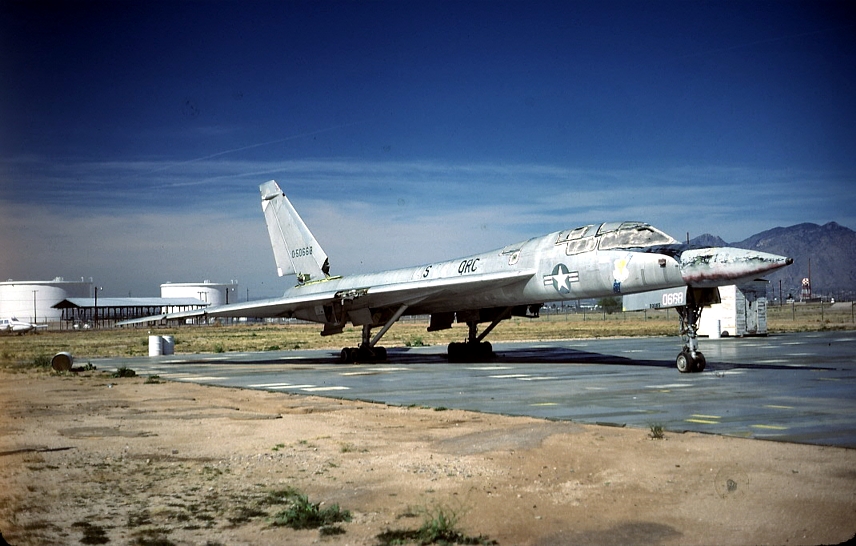 |
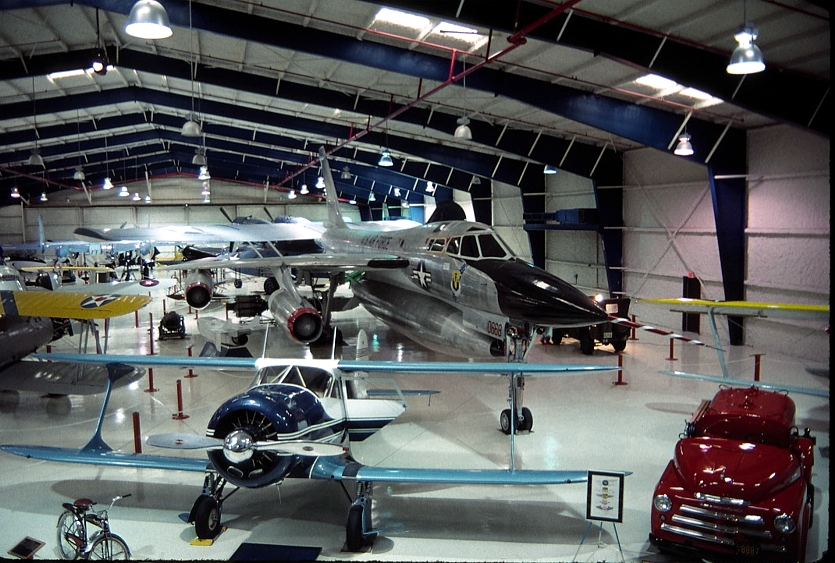 |
This AT-11 spent many years at the El Paso International Airport prior to being brought back to air worthiness and flown out in the early 1980s. The only identification is the "N" number: N7275C. I have yet to connect that to any AT-11 serial number. (It turns out that this AT-11 is actually a former Navy SNB-1, Bu. No. 51025. The aircraft is currently airworthy and owned by Paul Walton of Indianapolis, IN.)
On December 11, 1953 a B-36D crashed into the
west slopes of the Franklin Mountains. For
a visit to the crash site click HERE.
Not all subjects are aircraft...
 |
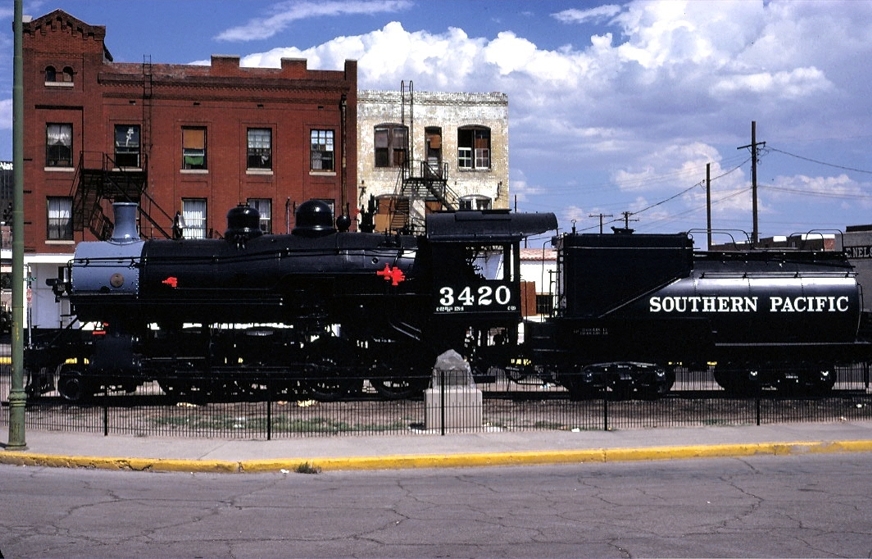 |
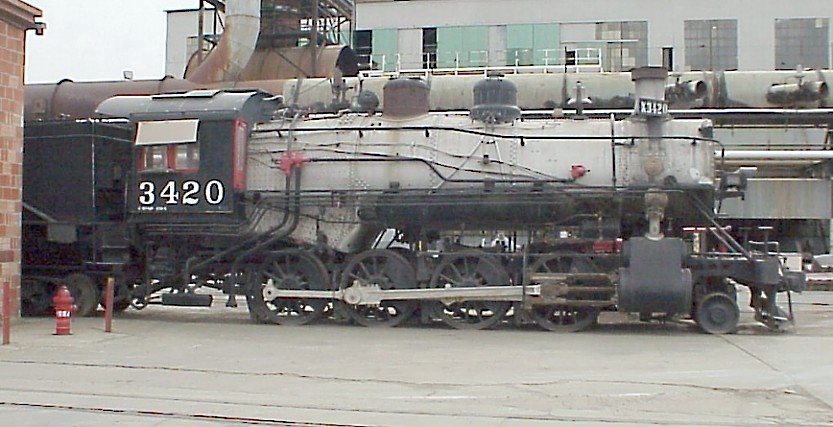 |
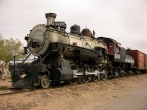 |
This Southern Pacific 2-8-0, number 3420, was at one time displayed in front of the SP yards in El Paso. She had been built for the El Paso and Northeastern Railroad in 1904 as No. 171. The El Paso and Southwestern acquired the EP&NE and renumbered her as No. 271, before the SP bought the EP&SW and gave her the current number In 1956 she was retired as a display. .During the 1980s it was made operable by local train enthusiasts and ran for several years. During that time an "illegal" weld was made on the boiler and consequently she has not run for several years. The Consolidation now sits at the Phelps Dodge refinery awaiting her uncertain fate. (Don Fenton)
During mid November, 2004 she was placed on temporary display, in part to gauge local support for limited operation. (CB)
The next three shots are of the restored (cosmetic) El Paso & South Western Engine Number 1. This steam engine had been a reliable asset to the EP&SW before being retired and placed on display in El Paso. After several moves the engine was restored and placed on display in El Paso's Union Plaza Transit Terminal (thanks to Ron Dawson for the correct location) in February, 2004. The depot is now home to the city's Sun Metro. The display is a very nice with some good information on El Paso's railroad history and some good detail on the EP&SW. The location of the engine indoors makes for some difficult photography, but it is well lit and most importantly protected from the elements and vandals. May 10, 2004 (CB)
 |
 |
 |
This M4 Composite hull Sherman is at the General Patton Museum located in Chiriaco Summit, California. From looking at this vehicle it is evident that it had been on a Nellis AFB firing range for some time, note the pock marks in the armor from projectiles strikes. Another good museum, I intend to post more photos at a later time. Photo taken in March, 2003. (CB)
Contrast the condition of the above Sherman to this M4A1E8 displayed at the 45th Infantry Division Museum in Oklahoma City. July, 2003. (CB)
An M60A3 Patton on display at the Vietnam War Memorial in Big Spring, Texas. September, 2003. (CB)
This reproduction of a 1915 Jeffery Quad armored car is on display at the Pancho Villa State Park in Columbus, New Mexico. The park encompasses the site of Camp Furlong, the Army post from which troops of the U.S. Cavalry confronted Villa's forces during the raid of March 9, 1916. The first of the series was taken in May, 2004, the others were taken in May, 2006 after a new museum was opened at the park. (CB)
 |
 |
 |
 |
During the course of WW II the Army Air Force required a huge training program and consequentially many training bases were built across the United States. Some later became local civilian airports, while many were simple abandoned and allowed to fall into disrepair.
The Deming, New Mexico airport is on the site of the WW II era Deming Army Airfield. The general aviation operations have moved to the north side of the airport leaving the Deming AAF area on the South side less populated. Three of the WW II era hangars survive in rather good repair. There are several other building in various states of decay, along with the foundations on many more. Part of an abandoned rail spur still runs up to one of the old loading docks. At least one of the hangars is still in use and there is occasional activity on this part of the airport. This Convair 240, N327UW started life as a USAF C-131A, serial number 52-5796. A very clean airplane it appeared to be in short term storage. The above photos were taken in September, 2003. My site on the history of the Deming Army Air Field. (CB)
Big Spring, Texas was home to the Big Spring AAF, a bombardier training base. In 1945 the base became the Big Spring Municipal Airport. It became Webb AFB when re-activated in 1951 and trained Air Force pilots until its closure in 1977. The city of Big Spring took over the former base and re-named it the Big Spring Industrial Airpark. The area still has a military appearance, with many older buildings surviving.
On the far side of the airport from most activity are the old Alert Barns that provided shade for the interceptor aircraft that one time stood alert at Webb. At various times those were F-86Ds, F-102s and F-104s. Near what was Transient Alert during the Air Force days, the old control tower stands guard over an empty ramp in September, 2003. Some buildings have fared better and through the efforts of many volunteers the Hangar 25 Museum has taken up residence inside of that hangar. The white Toyota truck is my airshow truck and not one of the exhibits! Though small this museum is a worthy endeavor and I wish it great success. (CB)


During the course of WW I a shortage of iron and steel was projected. To alleviate this various projects were started to use alternate materials for ship construction. Some large ships were built of wood, but at least sixteen were constructed from concrete, with an additional two un-named vessels not completed. The SS Selma was one of the completed ones. She was Launched June 14, 1919. In May 1920 on her return voyage from Tampico, Mexico she struck a jetty and was towed to Galveston, Texas. Her machinery was removed and she was sunk off of Pelican Island in Galveston Bay, where she is still visible. The WWI project was rather unsuccessful, but a concrete ship program during the Second World War was very successful. The first photo was taken in November, 1985, the second was taken on a cold December day in 1999. (CB)
Sometime structures stand out for some inexplicable reason. One of those was for me a trestle in Wills Canyon south of Cloudcroft, New Mexico. The trestle had been built sometime in the early Twentieth Century by the South West Lumber company. It was a welcome surprise when I discovered it as a boy scout and over the years I would hike up to it from Bluff Springs. It slowly deteriorated, but somehow always looked sturdy. But on a visit in February, 2006 I found that it had finally succumbed to the elements and most likely collapsed during a storm. The first photo was taken in 1997 and the second and third in February 2006.
And now for something completely different... Some things are a bit more whimsical such as a roadrunner made from junk and cast-offs. This composite Chaparral stands guard over I-10 west of Las Cruces, NM. Is he looking for a stray VW Beetle? The second photo gives a good scale of height compared to my eldest daughter. (CB)
To return to:
Page created 09-12-03
Modified 03-01-20
